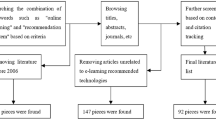Abstract
The context of teacher is indescribable without considering the multiple overlapping contextual situations. Teacher Context Ontology (TCO) presents a unified representation of data of these contexts. This ontology provides a relatively high number of features to consider for each context. These features result in a computational overhead during data processing in context-aware recommender systems. Therefore, the most relevant features must be favored over others without losing any potential ones using a feature selection approach. The existing approaches provide struggling results with high number of contextual features. In this paper, a new contextual ontology-based feature selection approach is introduced. This approach finds similar contexts for each insertion of new teacher using the ontology representation. Also, it selects relevant features from multiple contexts of a teacher according to their corresponding importance using a variance-based selection approach. This approach is novel in terms of representation, selection, and deriving implicit relationships for features in the multiple contexts of a teacher.
This work was funded by the French Research Agency (ANR) and by the company Vivocaz under the project France Relance - preservation of R &D employment (ANR-21-PRRD-0072-01) in collaboration with project Imhotep “Preventing teachers’ psychosocial risks through contextual support of educational resources”.
Access this chapter
Tax calculation will be finalised at checkout
Purchases are for personal use only
Similar content being viewed by others
References
Alelyani, S., Tang, J., Liu, H.: Feature selection for clustering: a review. In: Data Clustering: Algorithms and Applications, vol. 29, no. 1 (2013)
Alyahyan, E., Düştegör, D.: Predicting academic success in higher education: literature review and best practices. Int. J. Educ. Technol. High. Educ. 17(1), 1–21 (2020). https://doi.org/10.1186/s41239-020-0177-7
Cabaleiro-Cerviño, G., Vera, C.: The impact of educational technologies in higher education. GIST Educ. Learn. Res. J. 20, 155–169 (2020)
Chen, H., Finin, T., Joshi, A.: An ontology for context-aware pervasive computing environments. knowl. Eng. Rev. 18(3), 197–207 (2003)
Dong, G., Liu, H.: Feature Engineering for Machine Learning and Data Analytics. CRC Press, Boca Raton (2018)
Guyon, I., Elisseeff, A.: An introduction to variable and feature selection. J. Mach. Learn. Res. 3(Mar), 1157–1182 (2003)
Haruna, K., et al.: Context-aware recommender system: a review of recent developmental process and future research direction. Appl. Sci. 7(12), 1211 (2017)
Kamalov, F.: Orthogonal variance decomposition based feature selection. Expert Syst. Appl. 182, 115191 (2021)
Kamalov, F., Moussa, S., El Khatib, Z., Mnaouer, A.B.: Orthogonal variance-based feature selection for intrusion detection systems. In: 2021 International Symposium on Networks, Computers and Communications (ISNCC), pp. 1–5. IEEE (2021)
Kraskov, A., Stögbauer, H., Grassberger, P.: Estimating mutual information. Phys. Rev. E 69(6), 066138 (2004)
Kuhn, M., Johnson, K.: Feature Engineering and Selection: A Practical Approach for Predictive Models. CRC Press, Boca Raton (2019)
Kuhn, M., Johnson, K.: Applied Predictive Modeling. Springer, New York (2013). https://doi.org/10.1007/978-1-4614-6849-3
Lakshmi Padmaja, D., Vishnuvardhan, B.: Variance-based feature selection for enhanced classification performance. In: Satapathy, S.C., Bhateja, V., Somanah, R., Yang, X.-S., Senkerik, R. (eds.) Information Systems Design and Intelligent Applications. AISC, vol. 862, pp. 543–550. Springer, Singapore (2019). https://doi.org/10.1007/978-981-13-3329-3_51
Lindig, C.: Fast concept analysis. Work. Concept. Struct.-Contribut. ICCS 2000, 152–161 (2000)
Mabkhot, M.M., Al-Samhan, A.M., Hidri, L.: An ontology-enabled case-based reasoning decision support system for manufacturing process selection. Adv. Mater. Sci. Eng. 2019 (2019)
Nashed, N.N., Lahoud, C., Abel, M.H.: TCO: a teacher context ontology. In: 2021 IEEE 24th International Conference on Computer Supported Cooperative Work in Design (CSCWD), pp. 757–762. IEEE (2021)
Nashed, N.N., Lahoud, C., Abel, M.H., Andrès, F., Blancan, B.: Mood detection ontology integration with teacher context. In: 2021 20th IEEE International Conference on Machine Learning and Applications (ICMLA), pp. 1710–1715. IEEE (2021)
Roberts, A.G., Catchpoole, D.R., Kennedy, P.J.: Variance-based feature selection for classification of cancer subtypes using gene expression data. In: 2018 International Joint Conference on Neural Networks (IJCNN), pp. 1–8. IEEE (2018)
Ross, B.C.: Mutual information between discrete and continuous data sets. PLoS ONE 9(2), e87357 (2014)
Sadeghyan, S.: A new robust feature selection method using variance-based sensitivity analysis. arXiv preprint: arXiv:1804.05092 (2018)
Seger, C.: An investigation of categorical variable encoding techniques in machine learning: binary versus one-hot and feature hashing (2018)
Solorio-Fernández, S., Carrasco-Ochoa, J.A., Martínez-Trinidad, J.F.: A review of unsupervised feature selection methods. Artif. Intell. Rev. 53(2), 907–948 (2020)
Veisi, H., Aflaki, N., Parsafard, P.: Variance-based features for keyword extraction in Persian and English text documents. Scientia Iranica 27(3), 1301–1315 (2020)
Zaffar, M., Hashmani, M.A., Savita, K., Khan, S.A.: A review on feature selection methods for improving the performance of classification in educational data mining. Int. J. Inf. Technol. Manag. 20(1–2), 110–131 (2021)
Author information
Authors and Affiliations
Corresponding author
Editor information
Editors and Affiliations
Rights and permissions
Copyright information
© 2023 The Author(s), under exclusive license to Springer Nature Switzerland AG
About this paper
Cite this paper
Nashed, N.N., Lahoud, C., Abel, MH. (2023). Contextual Ontology-Based Feature Selection for Teachers. In: González-González, C.S., et al. Learning Technologies and Systems. ICWL SETE 2022 2022. Lecture Notes in Computer Science, vol 13869. Springer, Cham. https://doi.org/10.1007/978-3-031-33023-0_10
Download citation
DOI: https://doi.org/10.1007/978-3-031-33023-0_10
Published:
Publisher Name: Springer, Cham
Print ISBN: 978-3-031-33022-3
Online ISBN: 978-3-031-33023-0
eBook Packages: Computer ScienceComputer Science (R0)




